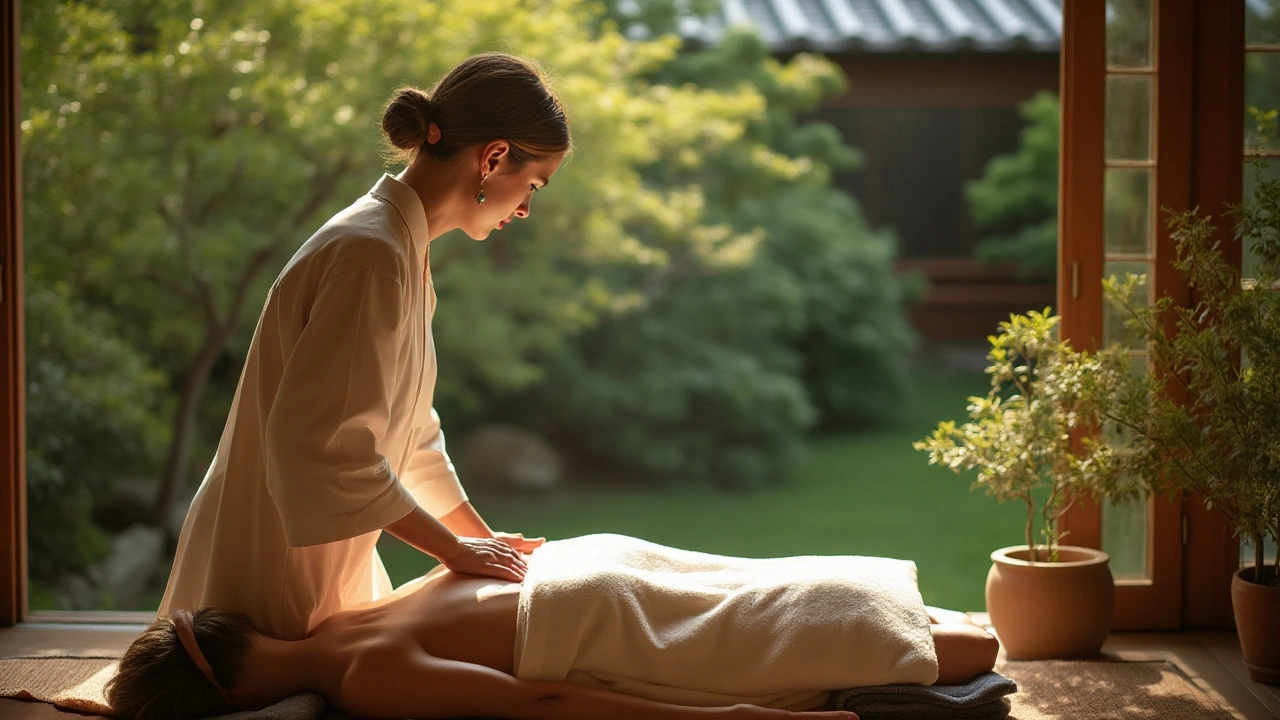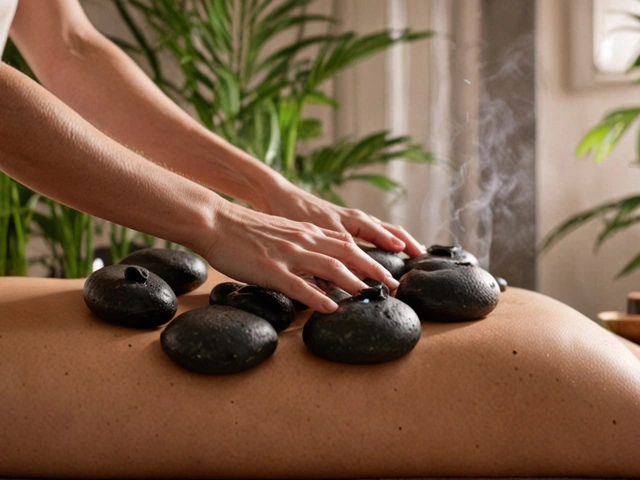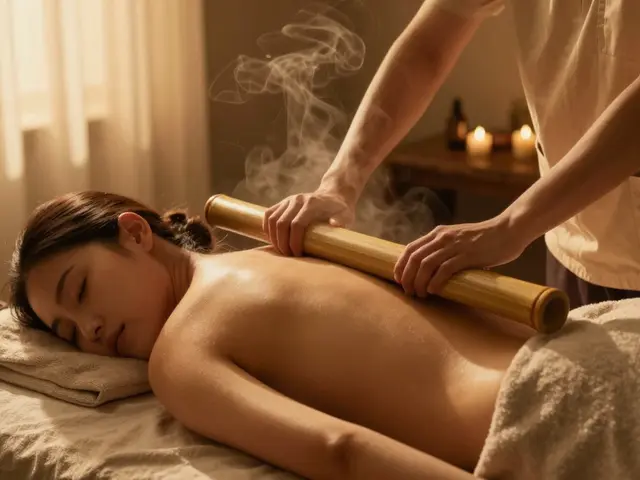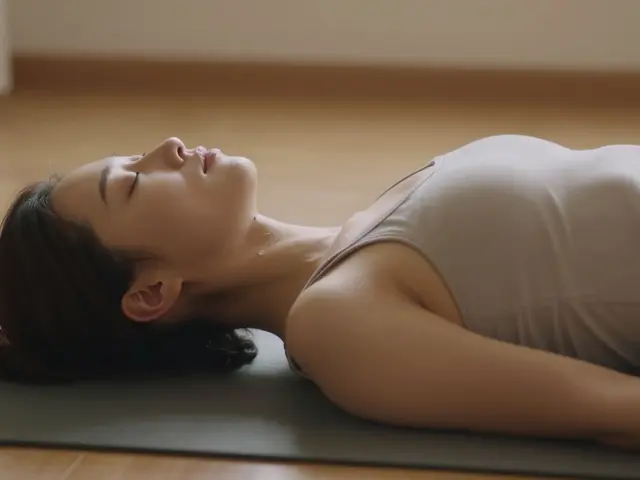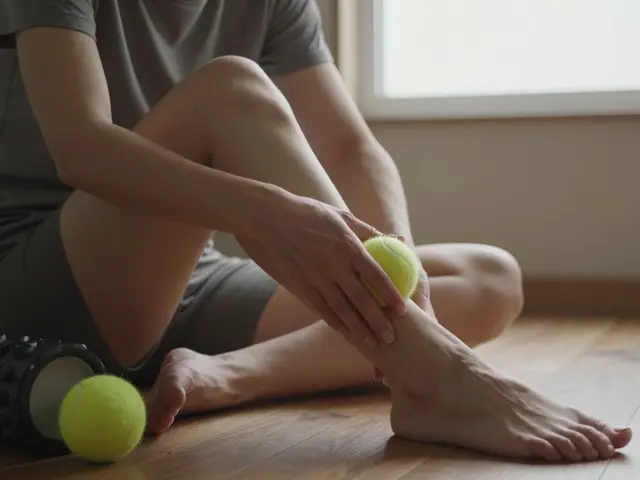Have you ever felt that your body needs a break from the relentless pace of modern life? Enter Shiatsu, an ancient Japanese technique that targets the tired, aching muscles that none of us seem to escape these days. Through the artful application of finger pressure and soothing stretches, this therapeutic method could be just what you need to restore balance and vitality.
Rooted deeply in the principles of traditional Chinese medicine, Shiatsu works on the body's meridian points to promote energy flow and improve overall health. It's like giving your body a gentle yet firm reminder to stand tall and breathe deeply. People across the world are seeking out this calming ritual not just for relief from physical discomfort but also for its myriad of health-boosting benefits.
Read on to learn how Shiatsu might just be the key to rejuvenating your life, from enhancing circulation to melting away stress and tension. Whether you're a long-time enthusiast or a curious newcomer, there's plenty to explore in this revitalizing journey.
- Understanding Shiatsu
- Health Benefits
- Incorporating Shiatsu into Daily Life
- Tips for Finding a Shiatsu Practitioner
Understanding Shiatsu
The serene practice of Shiatsu is a deep wellspring of relaxation, birthed centuries ago from the harmonious blend of Japanese tradition and Chinese medicine principles. This therapeutic art primarily involves the strategic application of finger pressure to specific points of the body, often referred to as acupoints. These points lay along meridian lines, which are believed to be pathways through which life energy, or 'qi,' flows. The idea is quite elegant – by stimulating these points, practitioners aim to unblock any stagnation in the energy flow, thus harmonizing the body and mind. Though Western science is just beginning to catch up, many people swear by the tangible peace and energy they feel post-session.
In each session, a Shiatsu therapist employs a variety of movements, including rhythmic finger pressure, joint rotations, and stretches tailored to individual needs. While the practice may sound complex, it is innately simple in its approach: to foster the body’s own ability to heal and enhance its natural functions. This concept of aiding the self-healing process is echoed by esteemed practitioners worldwide. As noted by Shizuto Masunaga, a pioneer of modern Shiatsu, in his teachings, “Our philosophy is not to correct the body, but rather to help the body flourish into its natural health through life energy regulation.”
The human body is a tapestry of intricate connections, and in Shiatsu, every small pressure point represents a significant area of this tapestry. Practitioners must undergo extensive training to become adept at identifying these points and understanding their relationship to overall health. A typical session takes place on a futon or mat, allowing the recipient to remain clothed and comfortable throughout the process. As the therapist works, the goal is to provide deep relaxation while also awakening the body's intrinsic healing capacities. Shiatsu is more than just a physical exercise; it’s a bridge to inner harmony.
For those curious about trying Shiatsu, knowing what to expect can significantly enhance the experience. Sessions typically last about 60 minutes, although this can vary depending on personal needs and practitioner style. The ambiance is often calm, accompanied by soft music or silence to promote tranquility. Notably, Shiatsu is not a one-size-fits-all therapy; each session is uniquely crafted to address specific health concerns or areas of tension. This personalized approach is one reason why Shiatsu stands out among other massage therapies. For instance, studies have indicated that regular sessions can help reduce stress, alleviate headaches, and improve sleep quality. Let’s not forget the compelling fact that maintaining a regular Shiatsu routine can boost your immune system by promoting better circulation and reducing stress hormones.

Health Benefits
Delving into the health benefits of Shiatsu reveals a vast tapestry of interconnected effects that might transform not just how your body feels, but also how it thrives. One key advantage of Shiatsu is its profound ability to enhance blood circulation. This seemingly simple act of improving circulation is like the domino effect for wellness. When your blood flows better, you carry more oxygen and nutrients to your cells. Toxins start getting flushed out of your system more efficiently. For someone living through daily stress, this means your body becomes more adept at healing and maintaining itself. This aspect helps boost your energy levels and might also contribute to that vibrant glow we all desire.
Another remarkable benefit of Shiatsu is its knack for easing muscle pain. Whether you’re an athlete pushing your physical limits or an office worker sitting for extended periods, muscle tension is a familiar foe. Here, the gentle yet firm pressure applied during a Shiatsu session can help soften those stiff tissues. By targeting areas of tension and promoting relaxation, Shiatsu’s circular movements ease discomfort and restore flexibility. The relief experienced here is often not just immediate but upgrades your range of motion. Some practitioners argue that regular sessions could complement physical therapies, enhancing recovery from minor injuries and muscle strain.
Shiatsu also stands out for its potential to improve mental clarity and well-being. This therapeutic practice aligns with wellness seekers aiming to combine physical health with mental peace. By working on specific meridian points, Shiatsu doesn’t just address physical symptoms; it also harmonizes your mental landscape by reducing stress and anxiety. The rhythmic and guided nature of the treatment serves not just as a form of physical relief but resonates with your whole being. The connection between a relaxed body and a clear mind cannot be understated, a sentiment echoed by many practitioners, who see their clients leave with a refreshed outlook.
A study by the British Shiatsu Society highlights: "Regular Shiatsu treatments are associated with improved energy balance and reduced stress levels, providing an increased sense of well-being and vitality."
Digesting these benefits might prompt the curious to wonder how Shiatsu works its way into one’s health routine. One intriguing angle is the therapy’s impact on the autonomic nervous system. By calming the nervous system, Shiatsu might significantly reduce symptoms of insomnia and even support deeper sleep cycles. This relaxation effect extends its benefits to people suffering from chronic conditions such as headaches and migraines, where relaxation can actively dissipate tension. While Shiatsu embraces ancient roots, it harmonizes beautifully with contemporary needs, offering a natural route to integrate bodily healing and mental solace. It's about nurturing not just your physical body, but leveraging touch to cater to your emotional and psychological realms as well.
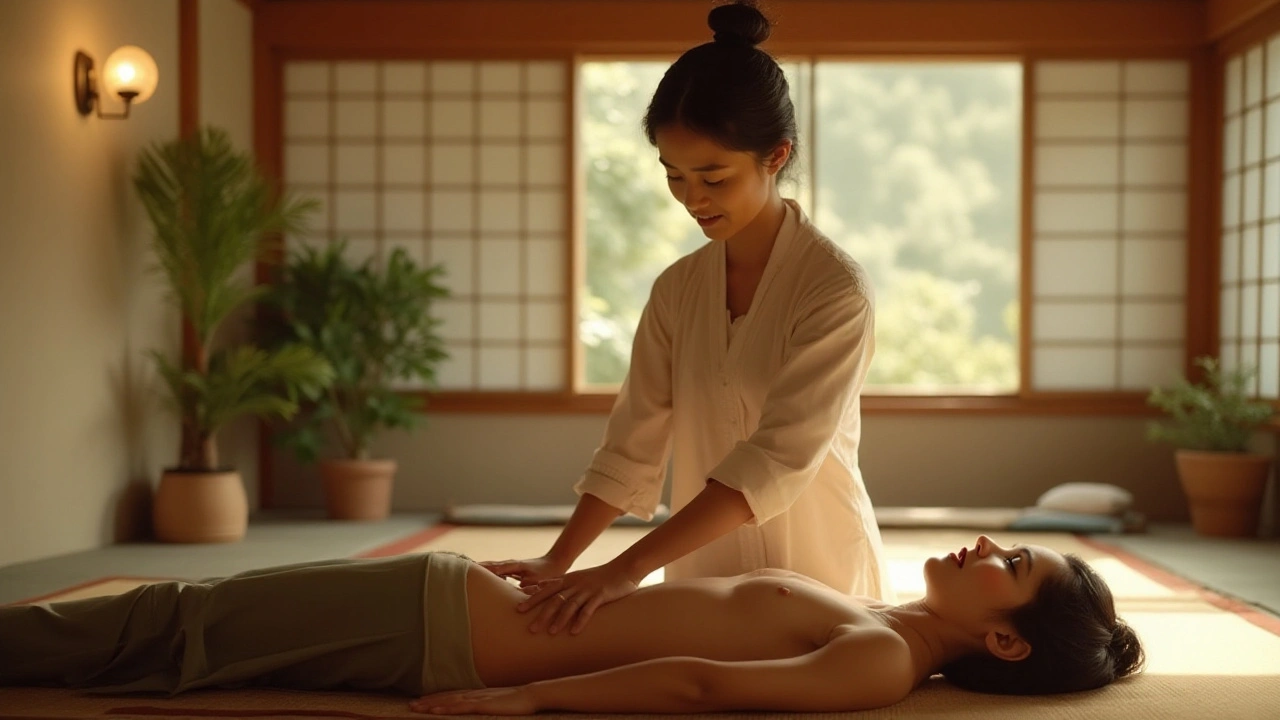
Incorporating Shiatsu into Daily Life
Bringing Shiatsu into your everyday routine might seem like a daunting task at first, but it can be surprisingly easy and rewarding with a few simple adjustments. Start by setting aside a specific time during the day for this practice. Whether it's part of your morning ritual or an evening wind-down, consistency will help your body and mind adjust and benefit more fully. Having this dedicated time creates a habit, making it easier to maintain and appreciate. You might find it helpful to create a conducive environment as well, perhaps with calming music or the gentle glow of a candle to signal relaxation and transformation ahead.
For those who aim to practice massage therapy at home, learn the foundational techniques. There are numerous resources available, from books to online tutorials, that can guide you through the basic movements. Aim to focus on key meridian points that correspond to areas of tension or specific health issues you frequently encounter. This focused attention can lead to remarkable improvements. Remember to listen to your body; if something doesn’t feel right, it’s best to stop and consult with a professional. Like building any new skill, patience and practice are essential.
Sometimes, despite your best efforts, it can be beneficial to seek out a professional **Shiatsu practitioner** for guidance. A trained professional not only enhances your knowledge but can also offer personalized sessions that target your unique health needs. Many practitioners offer lessons or workshops that blend personal sessions with learning opportunities. It’s worthwhile to explore local wellness centers or even online reviews to find a reputable therapist. Attending regular sessions can provide both physical relief and a deeper understanding of this ancient craft.
According to Dr. John Mark, a renowned expert in traditional therapies, "Regular Shiatsu massage promotes a profound state of relaxation and can enhance one's quality of life significantly by alleviating stress-related symptoms."
Another effective way to integrate Shiatsu into your lifestyle is through group classes or workshops. These settings provide community support and encourage commitment, while allowing you to learn in a social and interactive environment. Events like these are often held by wellness centers and can introduce you to like-minded individuals who share your interest. Motivation often flourishes in group settings, so if you're keen but struggle to keep going on your own, these groups may just be your saving grace.
Tools and props can also assist in incorporating Shiatsu into daily life. Simple items like a tennis ball or a special mat can help you practice techniques like acupressure at home. These items are particularly useful for targeting harder-to-reach areas of the body. Utilizing such tools can expand your practice by providing new opportunities to relieve tension and improve flexibility. Remember, the goal of Shiatsu is to promote balance and harmony in your life. By slowly weaving this practice into daily routines, you can experience a flourishing sense of well-being and vitality.

Tips for Finding a Shiatsu Practitioner
Choosing a Shiatsu practitioner involves more than just locating a nearby spa or clinic. It’s about finding a healer whose expertise and energy align with what you need from this ancient therapy. Knowledge and experience are crucial. You want someone who understands not only the intricate dance between muscle tonus and meridian lines but also how to tailor each session to your body’s unique needs. Start by asking for recommendations from friends or family who appreciate holistic health approaches, as word of mouth can be incredibly insightful. Consider online reviews, but take them with a pinch of caution—each person's experience is subjective. Look for practitioners with certifications from respected Shiatsu schools, as these credentials often come with rigorous training and adherence to ethical standards.
Once you have a few names, prepare a list of questions to guide you. Inquire about their specific training, years in practice, and what approach they might use to address your concerns. Knowing what to ask can help you zero in on a practitioner focused on Shiatsu as a therapeutic journey rather than just a routine. Remember, communication between you and your practitioner is key, so look for someone who listens actively, making you feel heard and understood. Comfort and compatibility are important. The practitioner-client connection can significantly impact your healing process.
Consultation and First Impressions
A consultation can be a great way to gauge potential candidates. It's your opportunity to glimpse their philosophy and approach to wellness. During this initial meeting, pay attention to their listening skills and how they address your queries or concerns. Notice their demeanor and how it relaxes or agitates you. Trust your gut feeling; part of healing is about feeling safe and comfortable. Take note of the therapy room's environment too; a clean, serene, and welcoming space often mirrors a practitioner's level of professionalism.
Massage therapy is intensely personal. It involves someone entering your physical space, so it's essential they value your comfort at all times. Address any apprehensions you might have about the therapy process. An ideal practitioner should address your questions confidently, respecting your personal boundaries while creating an approachable and flexible treatment plan. Your ease during these discussions could hint at the tone of the future sessions.
Checking Credentials and Reviews
Be thorough when investigating a potential practitioner’s background. It's worth understanding their journey into this field—what led them to practice Shiatsu? Their story often highlights passion and dedication, important for someone tasked with aiding your health journey. Don't hesitate to ask about their professional associations, as many practitioners are part of networks that uphold continuing education and skill refinement. Additionally, explore any testimonials from past clients that speak to their technique's effectiveness. A competent therapist will undoubtedly have a trail of satisfied clientele who return time and again for their healing touch.
Keeping these tips in mind should lead you to a competent, credible Shiatsu practitioner. Remember, Shiatsu is a journey, not a one-time fix. The trust and connection you build with your therapist can significantly enhance your benefits from Shiatsu. So take your time finding the right match, settle for nothing less than what makes you feel both safe and appreciated, and open the door to a healthier life.

